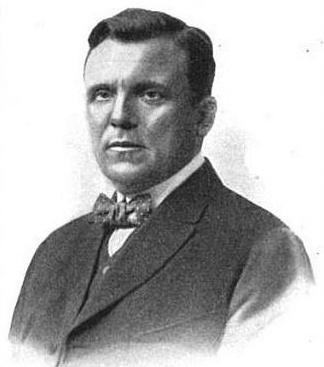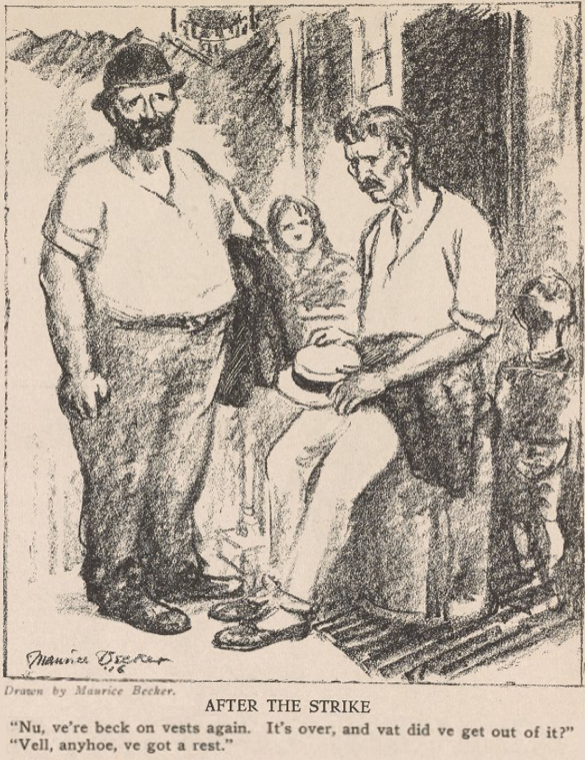There are no limits to which
powers of privilege will not go
to keep the workers in slavery.
-Mother Jones
Hellraisers Journal, Tuesday November 7, 1916
New York, New York – Frank P. Walsh on Bayonne Strike
From The Labor World of November 4, 1916:
BAYONNE TROUBLE FAULT OF OIL CO. SAYS FRANK WALSH
—–
NEW YORK, Nov. 2.-“Wherever there is a big Rockefeller interest, there you find brutal slave driving methods in the treatment of underpaid workers,” declared Frank P. Walsh, chairman of the Committee on Industrial Relations, in New York, at the height of the Bayonne strike.
[Mr. Walsh continued:]
The most dangerous as well as brutal feature of the Rockefeller treatment of labor, is the close control that the Rockefeller concerns gain over the police and other public authorities. With the mayor of Bayonne confessing that he is a hired attorney for the Rockefeller interests, and with the police department using its full force, and hundreds of special deputies [deputized company gunthugs] to beat and kill the revolting strikers, the American public has its latest demonstration of what Rockefellerism means.
Can’t Break Spirit.
Let me call attention here to the fact that just a few days ago on the very site of the Ludlow massacre, 500 and more unafraid coal miners for the Colorado Fuel Iron Company (a Rockefeller corporation) joined in a union affiliated with the United Mine Workers of America. That splendid fact proves that Rockefeller cannot break down the spirit of his workers, however much he may be able to beat them back into sullen subjection, as he has done in Bayonne.
The breaking of the strike of unorganized and helpless Polish men and women was brought about by such complete brutality that every newspaper in New York constrained to publish articles in protest. Many of these newspapers, in fact, most willingly, condemned the methods of the police. Just what these methods were can be partly surmised from the following statement of the chief inspector of police, who worked for the Rockefeller interests precisely as if he were their hired man. Inspector Cady was quoted in the New York Evening Post in these words:
“How the blank can you expect to deal with these blankety-blank-blanks, unless you can go after ’em right? The only way is to shoot on sight whenever they try to make trouble. They’re just a lot of Hunks, and they think a strike is a war, and they don’t understand anything but bullets. Shoot ’em-that’s the only way.”
Police In Control.
In a letter to the New York newspapers after the strike had been in progress three or for days, Dante Barton, representing the Committee on Industrial Relations, wrote:
“Permit me to say in your paper, after personal investigation in Bayonne that the conditions there are the usual ones where a great number of unorganized and underpaid workers break forth in revolt. The conditions there are that the great crowd of the strikers are like a crowd of sheep, infuriated, even as sheep can become, and opposed to them is a disciplined number of policemen, special deputies and private gunmen. The control of the situation at every moment, so far as there was control, lay with the police and gunmen. The only unsafe portion of Constable Hook for me to visit was that portion in the actual possession of the police. Three minutes before I reached a street intersection, a woman had been killed in a second story window, near that crossing, and from half a dozen to a dozen persons wounded, some seriously, by shots fired by the police and guards.”
Mr. Amos Pinchot, representing the National Labor Defense Council, has joined me in sending to the Department of Labor the following telegram:
“We respectfully urge the Department of Labor to send conciliators or mediators immediately to Bayonne. Something should be done soon to stop the killing and wounding of strikers by policemen, deputies and gunmen in the employ of the Standard Oil. Personal investigation warrants this statement. Believe you can do much good to avert a reign of terror among thousands of workers who are being both terrorized and infuriated by such legalized injustice.”
I believe it will not forbid your publication of this statement, that those of us who [formed?] the Committee on Industrial Relations, and National Labor Defense Council, approach all industrial disputes from the standpoint of sympathy with the workers who have the ambition to try for better conditions in life.
Police Goad Strikers.
It is, of course, inevitable that when a great crowd of undisciplined workers break out in an ambitious revolt against conditions that have stunted and oftentimes brutalized them, that then there should be on their parts, acts of violence and resentment, but I give personal testimony that the brutality of repression, the absolute cruelty and wontonness of the police and gunmen in this second recent big Bayonne strike was enough to goad any set of men into acts of violence. It is both pitiful and terrible, that men and women who are forbidden the right to organize to get better wages and better living in an orderly way, are immediately clubbed, shot and terrorized, when they try through the only way which is permitted to them, to better their condition in life.
To blame only the inarticulate sheep who have been goaded into temporary fury by acts of cruelty and incompetence sanctioned by law, is merely to accentuate the danger. If the public could know all the immediate facts and the economic background out of which these facts spring, the active sympathy of the public would necessarily be with the unhappy workers for the Standard Oil in Bayonne.
In response to the telegram of this committee, and of the National Labor Defense Council, the labor Department at Washington sent John A. Moffit as investigator. Mr. Moffitt has urged complete federal investigation into the causes of the strike and its events.
[Photograph added.]
From The Masses:
SOURCE
The Labor World
(Duluth, Minnesota)
-Nov 4, 1916
https://www.newspapers.com/image/49876695
IMAGES
Frank P Walsh from Harper’s Weekly of Sept 27, 1913
https://books.google.com/books/reader?id=i2wyAQAAMAAJ&printsec=frontcover&output=reader&source=gbs_atb&pg=GBS.RA2-PA24
After the Strike, M Becker, Masses, Nov 1916
http://dlib.nyu.edu/themasses/books/masses067/11
See also:
Tag: Bayonne Standard Oil Strike of 1916
https://weneverforget.org/tag/bayonne-standard-oil-strike-of-1916/
From Harper’s Weekly of Sept 27, 1913-
“Frank P. Walsh-The Man Chosen by President Wilson to Lead the Commission on Industrial Relations” by Dante Barton
https://books.google.com/books/reader?id=i2wyAQAAMAAJ&printsec=frontcover&output=reader&source=gbs_atb&pg=GBS.RA2-PA24
Maurice Becker
http://spartacus-educational.com/ARTbecker.htm
Commission on Industrial Relations
https://en.wikipedia.org/wiki/Commission_on_Industrial_Relations
For more on the formation of the Committee on Industrial Relations, see The New York Times of Nov 9, 1915:
http://query.nytimes.com/gst/abstract.html?res=9500E2D91239E333A2575AC0A9679D946496D6CF&legacy=true
WALSH HEADS BODY TO ADVANCE LABOR; Hopes to Have Business Controlled Entirely by the Working People. SEVEN ARE UNION MEMBERS New Committee on Industrial Relations Includes Amos Pinchot, F. C. Howe, and Bishop Williams.
To continue the work of the extinct United States Commission on Industrial Relations, there was organized at the Hotel Brevoort yesterday, under the leadership of former Chairman Frank P. Walsh, a new Committee on Industrial Relations, which the founders hope will in time so revolutionize industry that business will be controlled in time entirely by the working people.
[Emphasis added.]
For more on the formation of the National Labor Defense Council, see The Survey of Nov 25, 1916:
https://books.google.com/books/reader?id=5U05AQAAMAAJ&printsec=frontcover&output=reader&source=gbs_atb&pg=GBS.PA214
FANK P. WALSH, formerly chairman of the United States Commission on Industrial Relations; C. E. S. Wood, a lawyer of Portland, Ore.; Edward P. Costigan of Denver, counsel for John Lawson, the Colorado strike leader; Austin Lewis of San Francisco, and Amos Pinchot of New York, have joined what is to be known as a National Labor Defense Council, for the purpose of offering legal assistance to workers who do not belong to strong labor organizations, which are able to employ counsel for them. The organization has been promoted by a committee consisting of Fremont Older, editor of the San Francisco Bulletin; Helen Marot of the Women’s Trade Union League; Dante Barton of the Industrial Relations Committee; Lincoln Steffens and Ida Rauh, chairman. An effort is being made to raise a fund of $5,000 to maintain the field work. It is stated that the counselors are giving their services without compensation.
There Is Power In A Union – Billy Bragg
Now I long for the morning that they realise
Brutality and unjust laws can not defeat us
But who’ll defend the workers who cannot organise
When the bosses send their lackeys out to cheat us?


